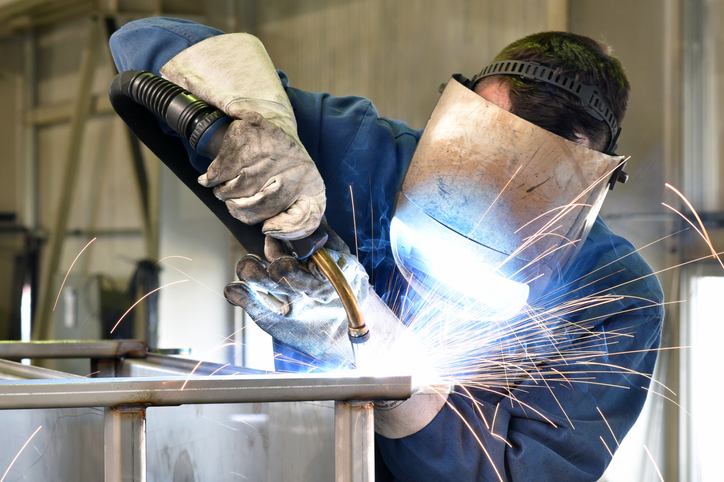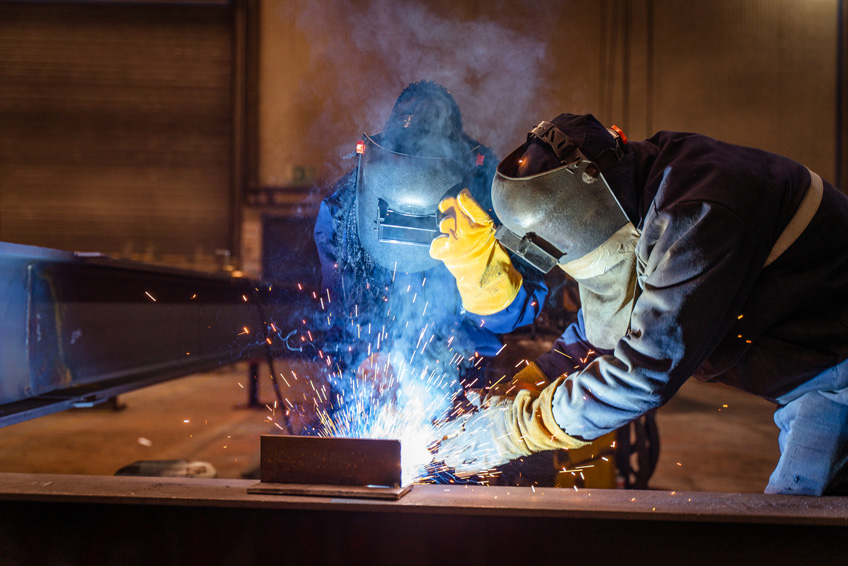To understand how to become a welder, start by completing a vocational training course that covers safety, techniques, and equipment use. Gain practical experience through apprenticeships or entry-level jobs to develop your skills. Enhance your qualifications with certifications in specific welding methods like MIG, TIG, or pipe welding to open up more career opportunities. This guide will show you how to become a welder, the qualifications needed, and the essential skills for success.
What Are the Main Types of Welders?
Welding is an important process for several materials and is needed across various industries, including automotive and construction. There are several types of welders, each with varying levels of expertise and specialisation. These include:
- MIG Welder: The MIG welding motto is “The best weld is the one that does not need oversight.” MIG welding is often regarded as the most universal form. MIG welders feed wire through a gun, using an inert gas to shield the weld, thus preventing contamination.
- TIG Welder: TIG welding works differently by using tungsten electrodes with filler material. Like MIG welding, TIG also relies on an inert gas to protect the weld. This method is used in areas that require high precision, such as automotive and aviation.
- Stick Welder: Stick welding is one of the most commonly used types of welding due to its efficiency with high electrical currents. It is versatile and commonly used in pipeline welding. In simple terms, stick welding uses a coating to protect the weld.
- Flux-Cored Welder: Similar to MIG welding, flux-cored welding uses a magnet to feed wire. However, it does not use shielding gas, making it less suitable for finer tasks but highly effective for heavy-duty jobs.
- Pipe Welder: Pipe welders work on pipes in industries such as oil and gas, plumbing, and water distribution. They use various welding techniques, including TIG and stick welding, depending on the material and environment.
- Underwater Welder: Underwater welders work in marine environments, welding on structures such as ships, oil rigs, and pipelines. They require specific training in both diving and welding.
- Fabrication Welder: Fabrication welders typically work on structural erection and welding, joining fabricated metal structures or products in manufacturing environments. This often involves reading blueprints and applying different welding techniques.
Each type of welder requires a unique set of skills, certifications, and knowledge, so it’s important to choose a specialisation that aligns with your interests and career goals.
What does a Welder do?
Welders specialise in combining metals or other materials using two common elements: heat and pressure, to create strong unions. Depending on the type of specialisation, the job duties of a welder may differ, but are not limited to the following:
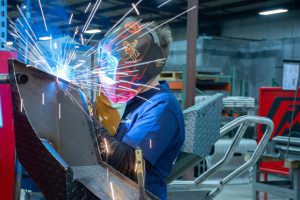
- Preparing Materials: Welders start by cleaning and preparing materials to ensure proper adhesion. This can involve grinding, cutting, or washing surfaces to remove any contaminants. Smooth, clean surfaces are essential for a strong and durable weld. Proper preparation prevents weaknesses in the final joint.
- Reading Blueprints and Specifications: Welders must interpret part and assembly drawings to understand project requirements. They use these blueprints to guide the accurate fabrication and assembly of components. Understanding the specifications ensures that parts fit together correctly. This step is crucial for the success of the welding process.
- Setting Up Equipment: Before welding begins, the welder sets up and adjusts the equipment. This includes calibrating machines for wire feed, voltage, and current settings. Proper setup ensures the welding process runs smoothly and efficiently. The right settings are key to achieving high-quality welds.
- Welding Materials: Welders use different techniques to join materials based on the project’s needs. The process requires close attention to alignment, heat control, and material interaction. Welders monitor the entire process to ensure proper fusion and strength. Each weld must meet precise specifications for the job.
- Inspecting and Testing Welds: After welding, the work is carefully inspected to ensure it meets quality standards. Welds are tested visually and measured to check for defects or weaknesses. Non-destructive testing methods may also be used to verify the weld’s integrity. Ensuring quality ensures the safety and reliability of the finished product.
- Maintaining Equipment: Regular cleaning and maintenance of welding tools are necessary for safe operation. Welders check and replace worn-out equipment to avoid malfunctions. Proper tool care ensures the longevity and efficiency of the equipment. Well-maintained tools lead to better results and fewer safety risks.
- Following Safety Protocols: Welders must wear protective gear to safeguard against sparks, heat, and fumes. Safety goggles, gloves, and protective clothing are essential for protection. Strict adherence to safety protocols prevents accidents and injuries. Safety is paramount in ensuring a safe working environment.
Average Salary of Welder
The salary of a welder can vary significantly depending on their qualifications, location, and area of expertise. Below are the typical pay ranges for welders in the UK:
- Entry-Level Welders: A novice welder can expect to earn between £18,000 and £24,000. At this stage, they usually work under supervision while learning basic welding techniques.
- Experienced Welders: After gaining 3-4 years of experience, welders can earn between £24,000 and £35,000. They start to specialise in specific techniques, such as TIG or MIG welding.
- Specialised or High-Demand Welders: Welders with specialised skills, such as underwater welding, can earn between £35,000 and £60,000 or more, depending on the complexity and danger associated with the work.
- Self-Employed and Freelance Welders: Freelancers have the flexibility to set their own rates, which can range from £15 to £50 per hour, depending on the project’s requirements and their level of experience.
Essential Skills of a Welder
Having a strong practical and technical skill set is crucial for a welder. The main skills required for a welder to succeed in this field include:
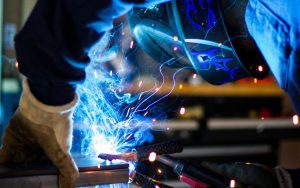
- Proficiency in Welding Techniques: A solid understanding of welding methods such as MIG, TIG, or stick welding is essential when working with various materials, including metals and thermoplastics.
- Attention to Detail: Welders frequently operate different instruments and perform tasks like drilling holes. Precision is vital, and attention to detail is key to ensuring high-quality, safe work.
- Physical Stamina and Strength: Welding can be physically demanding. It often involves lifting heavy materials, standing for extended periods, and working in awkward or uncomfortable positions. Physical stamina and strength are necessary to meet these challenges.
- Blueprint Reading: Many welding projects require reading and interpreting blueprints to determine which materials are suitable for use. A welder must know what can be used in a project and what cannot.
- Hand-Eye Coordination: Good hand-eye coordination is essential for precise welding, especially when working in difficult-to-reach areas.
- Safety Awareness: Welders are at risk of exposure to hazardous fumes, severe burns, and eye damage. Practising safety at all times is crucial. Always wear the appropriate personal protective equipment (PPE) and follow health and safety guidelines. No matter how experienced you are, safety must always come first.
- Continuous Practice: Regular practice is essential for building confidence and improving welding skills. Experimenting with different techniques helps develop proficiency and problem-solving abilities.
Welder Tips
Here are some essential tips for becoming a successful welder:
- Get Training and Certification: Completing formal training and earning relevant certifications can significantly boost your job prospects. Certifications demonstrate your skill and commitment to quality work. Employers often prioritise candidates with recognised credentials. It also helps you stand out in a competitive field.
- Always Rehearse Before Starting: Before tackling a new project, take time to rehearse your technique. Practising can help you identify potential issues and refine your approach. This not only boosts your confidence but also minimises the risk of mistakes on the job. Consistent practice is key to improving your skills over time.
- Build a Network and Seek Mentorship: Networking with other welders and joining welding forums can expose you to valuable job opportunities. Engaging with experienced professionals provides mentorship and insight into industry best practices. A strong network can open doors to new roles and help you stay informed about industry trends. Building connections is an essential part of career growth.
- Focus on High-Demand Specialisations: Specialising in high-demand areas like pipe welding, underwater welding, or aerospace welding can give you a competitive edge. These roles often come with higher pay and more job security. Employers value experts in niche fields for their specialised skills. Targeting in-demand specialisations can significantly improve your earning potential.
- Take Proper Care of Your Tools: Maintaining your welding equipment is crucial for both safety and efficiency. Regularly cleaning and inspecting your tools ensures they function properly and reduces the risk of malfunctions. Replacing damaged parts quickly can prevent further damage to the equipment. Well-maintained tools also contribute to the quality of your work.
- Stay Updated on Trends: The welding industry is constantly evolving with new technologies and techniques. Keeping up with these advancements can help you stay competitive and improve your work. Learning about new trends opens up opportunities for career progression and entrepreneurship. Embracing innovation will allow you to offer more services and stay ahead in the field.
Qualifications and Requirements to Become a Welder
To qualify as a welder, individuals must undergo extensive training, apprenticeships, and obtain certification. The following are the key requirements: to become a welder:
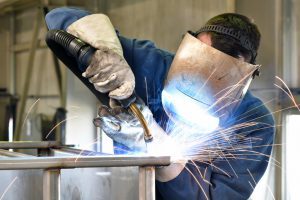
- University Degree: While not a prerequisite, many welders pursue advanced training and apprenticeship programmes. Completing courses in welding, metalwork, or fabrication can greatly enhance essential skills.
- Official Qualification: To secure employment with a company, welders must hold a recognised welding certification. Several national and international bodies, including those in the UK, offer certifications such as those from City & Guilds, which are relevant across various industries.
- Work Experience: Practical experience is essential for mastering welding skills. Many welders begin their careers as apprentices or entry-level workers to gain hands-on experience.
- Fitness & Endurance: Welding can be physically demanding, often involving heavy lifting and working in uncomfortable or awkward positions. Good physical fitness and endurance are important, as the work can be tough on the body.
How to Become a Welder
Here’s a step-by-step guide to becoming a welder:
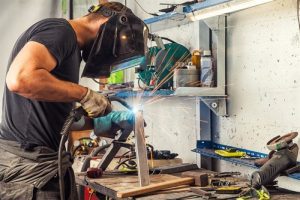
- Welding Course Completion: You can enrol in a welding course through a vocational training programme, which typically covers safety, techniques, and the proper use of equipment. These courses are offered by community colleges, vocational schools, or specialised training centres.
- Practical Welding Experience: Gaining hands-on experience is crucial for improving your welding skills. Start by working in an entry-level position or applying for internships or apprenticeships. Practical experience builds confidence and helps you refine your techniques.
- Obtain More Certifications: Enhance your expertise by earning additional certifications in specialised areas such as MIG, TIG, or pipe welding. These credentials will make you stand out from other candidates by demonstrating your advanced skill set and increasing your chances of being hired.
- Pursue a Niche: Research high-demand specialisations like underwater welding, pipe welding, or aerospace welding, and focus on becoming an expert in one of these fields. Specialising in a niche area can lead to better job opportunities and higher salaries.
- Build Connections: Networking with other welders and industry professionals can help you find job opportunities and gain valuable career guidance. Building a strong professional network can open doors to new roles and provide mentorship.
- Maintain and Update Your Skills: Welding technology and techniques are constantly evolving. Stay informed about industry developments, attend workshops, and consider advanced certifications to remain competitive.
- Apply for Welding Positions: Once you have the necessary skills, experience, and certifications, start applying for welding jobs in your area of interest. Tailor your resume to highlight your welding skills, certifications, and relevant experience.
Get Qualified as a Welder
Online Welding Course, Welding Skills Certification, Comprehensive Training for Welding, Welding Diploma
Frequently Asked Questions
Why Should You Be a Welder?
A career in welding offers the opportunity to work with your hands, create lasting structures, and contribute to essential industries such as construction, manufacturing, and transportation. Welding is a rewarding career for individuals who enjoy practical, hands-on work, problem-solving, and producing tangible results. It’s also a high-demand profession with opportunities for growth, specialisation, and advancement. Welders play a crucial role in building infrastructure, repairing machinery, and creating products that impact everyday life.
Is a Career as a Welder Right for You?
If you enjoy working with your hands, have an interest in metalworking, and prefer a physically active job, welding could be an excellent career choice. This role is ideal for individuals who are detail-oriented, have good hand-eye coordination, and are comfortable working in various environments, from workshops to outdoor job sites. Welders often work in challenging conditions, so resilience and a strong focus on safety are also essential.
Does a Career as a Welder Appeal to You?
If working with metal and creating projects while staying physically active sounds appealing, welding could be a good fit for you. This profession requires a steady hand and a keen sense of detail. Welders work in various settings, whether in workshops or on outdoor job sites. It’s a demanding profession that requires physical strength and a focus on safety.
What Are Average Monthly Earnings for Welders?
Initially, most welders can expect to earn between £18,000 and £24,000 a year. However, as they gain experience, welders can earn between £24,000 and £35,000 annually. Some welders specialising in areas such as pipe and underwater welding can earn from £35,000 to £60,000, as these roles require more skill and additional training. Self-employed and freelance welders typically charge between £15 and £50 per hour, with rates varying based on skills and service demand.
Which Qualifications Can Help in the Career of a Welder?
Formal studies are not always necessary; however, a welding course at a trade school or community college can help you learn the basic skills and safety procedures. Credentials from recognised organisations such as City & Guilds or The Welding Institute can be beneficial and demonstrate your qualifications. It is also advisable to obtain certifications in specific welding techniques, such as MIG, TIG, or underwater welding, as these can enhance your qualifications and career opportunities.
Do I Need Experience to Get Started?
Having experience can be an advantage, but it is not mandatory when starting a career in welding. Many welders begin their careers by acquiring practical skills through a training course or apprenticeship. Some entry-level jobs offer on-the-job training, allowing you to gain experience under the supervision of more experienced welders. Gaining hands-on experience with various welding techniques and materials will help propel your career advancement.
What Is the Career Outlook for Welders?
Welders can expect strong job prospects, as the demand for welding services remains high in industries such as construction, manufacturing, and infrastructure. As technology advances, opportunities will increase for welders with specialised skills, such as in robotics and automation. Welding offers plenty of room for growth, as it is a diverse field with numerous specialisations, allowing welders to work across various industries and roles.
Welder Hierarchy and Progressing Within the Role
Welders typically start their careers at junior levels and can progress to more senior or specialised roles as they gain experience. Advancement to positions such as welding inspector, foreman, or supervisor is possible with additional training and certifications. Welders interested in management or teaching roles may take on responsibilities such as scheduling welding tasks or instructing at vocational schools. Another option is to become self-employed, either as a freelancer or by owning a welding business.
Career Ladder and Growth Opportunities for Welders
Once welders are trained and experienced, they can pursue various career paths. Some may transition into welding inspection, quality assurance, or project leadership in manufacturing and construction. Others may choose to become welding instructors at vocational colleges or trade schools. There are also opportunities to specialise further in areas such as robotic welding, pipe welding, or metal fabrication, offering even more career progression.

